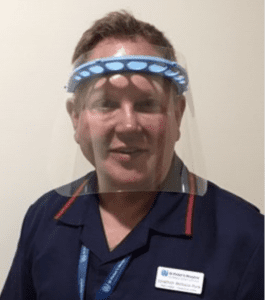The rapid onset of the coronavirus (COVID-19) has put many healthcare professionals under unprecedented pressure as they provide essential treatment and critical care to infected patients. Active8 Robots team of automation engineers has been using rapid prototyping techniques and manufacturing expertise to produce PPE (Personal Protective Equipment).
The Need for Face Shields
 There is a global shortage of Face Shields for use in hospitals, care homes and other residential establishments, not only for the treatment of COVID-19 patients but also to prevent it from spreading to the vulnerable.
There is a global shortage of Face Shields for use in hospitals, care homes and other residential establishments, not only for the treatment of COVID-19 patients but also to prevent it from spreading to the vulnerable.
Those providing front line care need protection from patients coughing and sneezing, thereby distributing infected respiratory droplets. Even though many individuals and groups are designing and manufacturing batch face shield frames, many designs are not optimised thus limiting scalability and in some cases cannot be accessed locally without the availability of 3D printers.
Active8 Robots Approach
With years of experience in 3D printing and adaptive manufacturing, Active8 Robots optimise a face mask frame design for 3D printing and started producing masks for distribution to local health care providers. However, despite having a great many adaptive printers at its disposal the company quickly realised that, with a print time for a mask frame in excess of 2hrs, would create a significant production bottle neck and a solution to speed up the process was needed. This resulted into an investigation and acceptance of a widely used rapid prototyping technique RTV (Room Temperature Vulcanisation) Silicone Moulding.
RTV Silicone Moulding
The use of RTV is attractive because of the low outlay and the wide global availability of the raw materials required. RTV Moulding, with Industrial RTV silicone formulations, are widely available online and commonly found in craft shops and hardware outlets.
Making parts out of these materials requires a master mould, which can easily be made out of a wide variety of materials including plastic.
RTV silicone will cure at ambient temperatures, (albeit over hours), so to speed up the process, the company used an oven to accelerate the curing process.
Visor Supporting Frame Production
Once sufficient silicone moulds have been produced a casting resin and hardener are mixed together (with any colouring additive required) and poured into the moulds for curing. In our tests in excess of 50 masks frames can be produced from one mould without any noticeable signs of wear to the mould.
![]()
Scaling Up Mask Shield | 3D Printer Vs RTV Silicone Moulding
It costs far less to produce silicone moulds (typically under £10) which in turn are used to manufacture the visor parts than it does to acquire and scale up 3D printers (costing several hundreds of pounds) thereby making it more scalable and accessible without the requirement of any specialised knowledge.
Active8 Robots is Committed to help alleviate PPE Shortages
If you are interested in supporting our activities or conversely are a medical device manufacturer, hospital or healthcare provider that needs help bridging gaps in the supply chain, please let us know your needs and we will endeavour to assist you.
